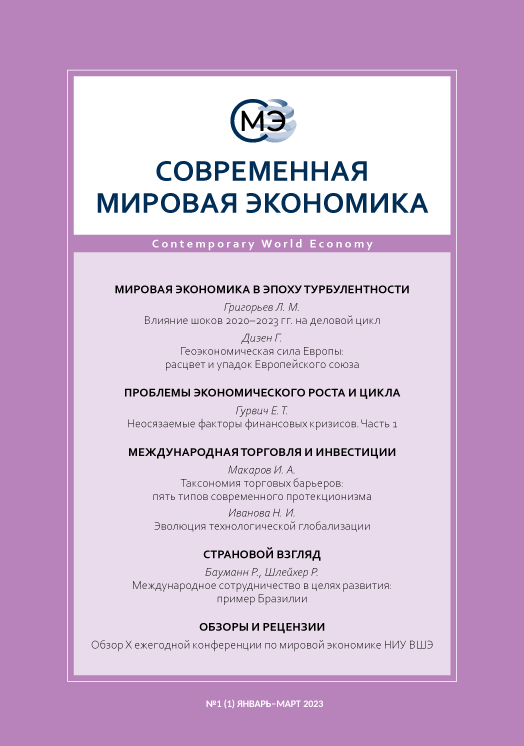Международное сотрудничество в целях развития: пример Бразилии
Аннотация
Международную помощь развитию со стороны развивающихся стран часто связывают с концессионным финансированием и гуманитарными инициативами и интерпретируют как средство проявления «мягкой силы». Такая помощь обычно не предполагает прямых денежных взносов, а сосредоточена в основном на технической поддержке, образовательной и научной деятельности, гуманитарной поддержке, помощи беженцам, миротворческих операциях и других партнерствах, осуществляемых при поддержке международных и региональных агентств. Помощь развитию со стороны Бразилии характеризуется довольно значительными и возрастающими объемами задействованных ресурсов и разнообразием реализуемых инициатив. Бразильские процедуры учета международного сотрудничества тесно связаны с методологией TOSSD, а также с экспериментальным проектом ЮНКТАД по количественной оценке сотрудничества Юг–Юг в целях развития. Все методологии вращаются вокруг проблемы измерения прогресса в достижении Целей устойчивого развития. Большинство проектов приносят пользу странам Африки и Латинской Америки, в то время как другие инициативы, как это ни парадоксально, приносят пользу и лицам из развитых стран.
Скачивания
Литература
Buss, P. and Burger, P. (orgs.), 2021. Diplomacia da Saúde: Respostas Globais à Pandemia. Rio de Janeiro: Fiocruz.
Giovanella, L. (org.), 2012. Políticas e sistema de saúde no Brasil. Rio de Janeiro: Fiocruz: Cebes.
IPEA – Instituto de Pesquisa Econômica Aplicada; ABC – Agência Brasileira de Cooperação, 2010. Cooperação brasileira para o desenvolvimento internacional: 2005-2009. Brasília: Ipea; ABC.
IPEA – Instituto de Pesquisa Econômica Aplicada; ABC – Agência Brasileira de Cooperação, 2013. Cooperação brasileira para o desenvolvimento internacional: 2010. 2. ed. rev. Brasília: Ipea; ABC.
IPEA – Instituto de Pesquisa Econômica Aplicada; ABC – Agência Brasileira de Cooperação, 2017. Brazilian cooperation for international development: 2011-2013. Brasília: Ipea; ABC.
IPEA – Instituto de Pesquisa Econômica Aplicada; ABC – Agência Brasileira de Cooperação, 2018. Cooperação brasileira para o desenvolvimento internacional: levantamento 2014-2016. Brasília: Ipea; ABC.
IPEA – Instituto de Pesquisa Econômica Aplicada; ABC – Agência Brasileira de Cooperação, 2020. Dimensionamento de Gastos das Instituições da Administração Pública Federal na Cooperação Brasileira para o Desenvolvimento Internacional: COBRADI 2017-2018. Brasília: Ipea; ABC.
IPEA – Instituto de Pesquisa Econômica Aplicada; ABC – Agência Brasileira de Cooperação, 2022a. Cooperação internacional em tempos de pandemia: Relatório COBRADI 2019-2020. Brasília: Ipea.
IPEA – Instituto de Pesquisa Econômica Aplicada; ABC – Agência Brasileira de Cooperação, 2022b. A Cooperação Internacional e Científica Brasileira em Foco: Relatório COBRADI 2021. Brasília: Ipea (Preliminary report).
Nye, J., 2004. Soft Power: The Means to Success in World Politics. N.Y.: Public Affairs.
Schleicher, R. and Barros, P., 2022. Medindo o Gasto Externo Brasileiro para a Implementação da Agenda 2030: O Novo COBRADI 2021-2024. Boletim de Economia Política Internacional, 33, Maio-Agosto, pp.139-157.
Schleicher, R. T., Miranda, M., Franco, S., 2022. Avaliação de efeitos da Cooperação Sul-Sul para o desenvolvimento do Brasil: um modelo geral para projetos bilaterais com países africanos de língua portuguesa (PALOPs). Brasília: Ipea (Text for discussion).



.jpg)

